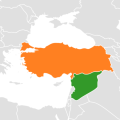Turkey-Israel trade tensions escalate amid Gaza conflict fallout

Within the wake of rising pressures stemming from the Gaza strife, Turkey and Israel discover themselves entangled in a new stage of their strained relationship, as exchange obstructions are raised, advancing the full political scene. These improvements, characterized by corresponding exchange confinements and heightened talk, reflect the complex dynamics at play in the locale, where geopolitical pressures regularly meet with residential political contemplations.
Turkey’s Exchange Limitations on Israel
Turkey’s decision to force trade restrictions on Israel marks a noteworthy acceleration in the continuous debate between the two nations. Taking after Israel’s blocking of Turkish military help flights to Gaza, Turkey quickly countered by declaring confinements on the sending out of different items to Israel. These confinements, influencing commodities such as aluminum, steel, development materials, fly fuel and chemical fertilizers are expecting to apply financial weight on Israel and flag Turkey disappointment with its activities in Gaza.
The timing of Turkey’s declaration is eminent, coming without further ado after Israeli Foreign Minister Hakan Fidan accused Israel of ruining compassionate help endeavors to Gaza and pledged to reply with an arrangement of measures until a ceasefire is announced and help streams continue. Turkey’s choice to impose trade confinements underscores its commitment to supporting the Palestinian cause and its eagerness to require concrete activity against Israeli animosity.
Israel’s Planning for Exchange Bans
In reaction to Turkey’s exchange limitations, Israel has signaled its availability to actualize bans on items from Turkiye. This tit-for-tat heightening in exchange measures highlights the breaking down relations between the two nations and the developing enmity fueled by the Gaza struggle. Israel’s decision to strike back reflects its assurance to state its sovereignty and protect its interface in the face of external pressure.
The prospect of exchange bans between Turkey and Israel raises concerns about the potential financial results for both nations. Turkey, a major exporter to Israel, stands to lose noteworthy income in the event that its exports are prohibited whereas Israel risks disturbing its supply chains and confronting backfire from its exchanging accomplices. The financial effect of these measures might strain respective relations and complicate endeavors to de-escalate pressures.
Residential Weights on Erdogan’s Government
Turkish President Recep Tayyip Erdogan’s government faces mounting household weight to require a harder position against Israel in light of its activities in Gaza. Erdogan, known for his vocal feedback of Israel’s treatment of Palestinians, has come beneath examination for his taking care of the emergency and his disappointment to satisfactorily guard Palestinian rights. Critics charge Erdogan of engaging in twofold measures by keeping up commercial ties with Israel whereas condemning its military activities.
The inconvenience of trade restrictions by Turkey reflects Erdogan’s endeavors to rally residential support and reinforce his government’s validity in the confrontation of feedback. By taking a firm stand against Israel, Erdogan seeks to request Turkish citizens and devout traditionalists who see the Palestinian cause as a central issue of Turkish character. In any case, Erdogan’s strategy carries dangers, because it might separate Turkey strategically and worsen pressures with Israel and its partners.
Effect on Respective Relations and Financial Contemplations
The acceleration of pressures between Turkey and Israel through exchange limitations undermines two-sided relations and disturbs financial ties between the two nations. In spite of later endeavors to normalize relations, such as the appointment of ambassadors in 2022, the current emergency underscores the delicacy of their relationship and the challenges of accommodating competing interfaces.
Keep Reading
The financial suggestions of the exchange restrictions are critical, with Turkey’s exports to Israel totaling $5.4 billion in 2023. The imposition of exchange obstructions seem to hurt businesses in both nations and weaken endeavors to advance financial participation and territorial solidity. In addition, the heightening of pressures may have broader geopolitical consequences, influencing territorial security flow and complicating endeavors to resolve the Gaza struggle.
The inconvenience of exchange confinements by Turkey and Israel reflects the growing tensions fueled by the Gaza struggle and the broader geopolitical elements in the region. The acceleration of dangers debilitates to compound existing divisions and complicate endeavors to promote peace and steadiness in the Middle East. As both nations explore the aftermath from their exchange debate, the stakes stay high, with the potential for assisting acceleration and flimsiness approaching huge.








